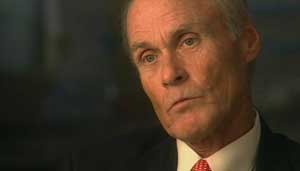
- Some highlights from this interview
- Does revealing sources really have a chilling effect on journalism?
- Why Goodale's interpretation of Branzburg was less than revolutionary
- Why the reporters in the BALCO investigation should testify
In his first Supreme Court oral argument, Reynolds represented the government in Branzburg v. Hayes. He argued against the existence of a Constitutional reporter's privilege that would provide immunity from testifying before a grand jury -- a position the Court upheld in its opinion. He went on to serve as assistant attorney general for civil rights during the Reagan administration before moving into private practice. This is the edited transcript of an interview conducted on Sept. 7, 2006.
How did you feel personally about [the reporter's privilege]? ...
... My own personal view is that the reporters are no different from those of us who are in society generally, and there are responsibilities and requirements out there that if subpoenaed, you have to go testify before a grand jury. It's hard for me to recognize why there should be an exception for a reporter if there's not an exception for anybody else.
We all have free press and free speech rights. I am entitled to write what I want to write and speak what I want to speak under the Constitution, but it doesn't give me a testimonial privilege that excuses me from testifying if I witness crimes or am involved in crimes or I'm associated with somebody who is involved in crimes. So it's difficult for me to accept that a testimonial privilege should be fashioned for those who are in the press that excuses them from an obligation that everybody in the country has.
So what do you say to reporters who argue ... how do you actually go out, do investigations, and promise somebody who's come forward confidentiality if you know ultimately you have a very high risk of going in front of a grand jury? ...
… I gather the reporter's mantra is: It's the public's right to know. I believe the public probably has a right to know about criminal activity, but I'm not
![News War [site home page]](../art/p_title.gif)







